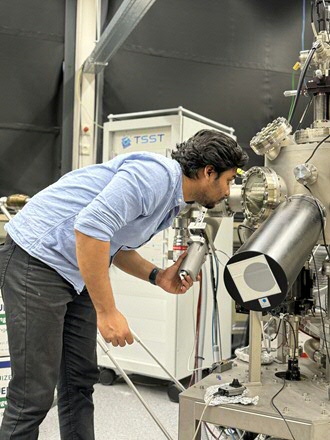Advent calendar - December 13th - Azminul Jaman
In the Zernike Institute Advent Calendar, we are presenting 24 short spotlights in December. In these specials, we highlight PhD students, postdocs, support staff and technicians of our research groups and team - providing a glimpse in their typical day at work. In Episode 13 meet Azminul Jaman, PhD researcher in the Spintronics of Functional Materials group under the supervision of Prof. Dr. Tamalika Banerjee and within CogniGron.

Unconventional computing approaches are rapidly gaining traction since our current computing applications as used in AI and in Internet of Things consumes large power. This global energy crisis has impacted our lives and environment and designing smart computing hardware that delivers energy-efficient solutions are in demand. Here, the human brain provides a good incentive, as it can perform computation with very little energy expenditure. In my research, I am working on one such hardware that exploits a network of connected devices, demonstrating biological functionalities as in the human brain.
I am working as a PhD researcher in the Spintronics of Functional Materials group under the supervision of Prof. Dr. Tamalika Banerjee and within the inspiring environment of CogniGron. We study spin and charge transport across various epitaxial oxide interfaces using electrical techniques. Such materials are endowed with competing ground states, with nominal energy variation, and arises due to the intricate coupling of spin, lattice, charge, and orbital degree of freedom. In my research, I focused on one such family of complex oxides where I studied the unconventional electrical response of a network of such oxides, in a thermodynamically unstable regime.
Working in Cognigron, led to expanding my experimental horizon from fabricating and studying devices to incorporating them in simple circuits. Discussions at CogniGron@Monday sessions and at the Research Away-day with my fellow researchers with different backgrounds has inspired me to think outside the box for my own research. In my daily work schedule, I grow thin film samples using pulsed laser deposition, perform structural characterization and thereafter use the NanoLabNL infrastructure to fabricate them into devices. I am happy to have integrated them in simple circuits and expand the application horizon of these devices for neuromorphic and probabilistic computing.
More news
-
15 September 2025
Successful visit to the UG by Rector of Institut Teknologi Bandung
